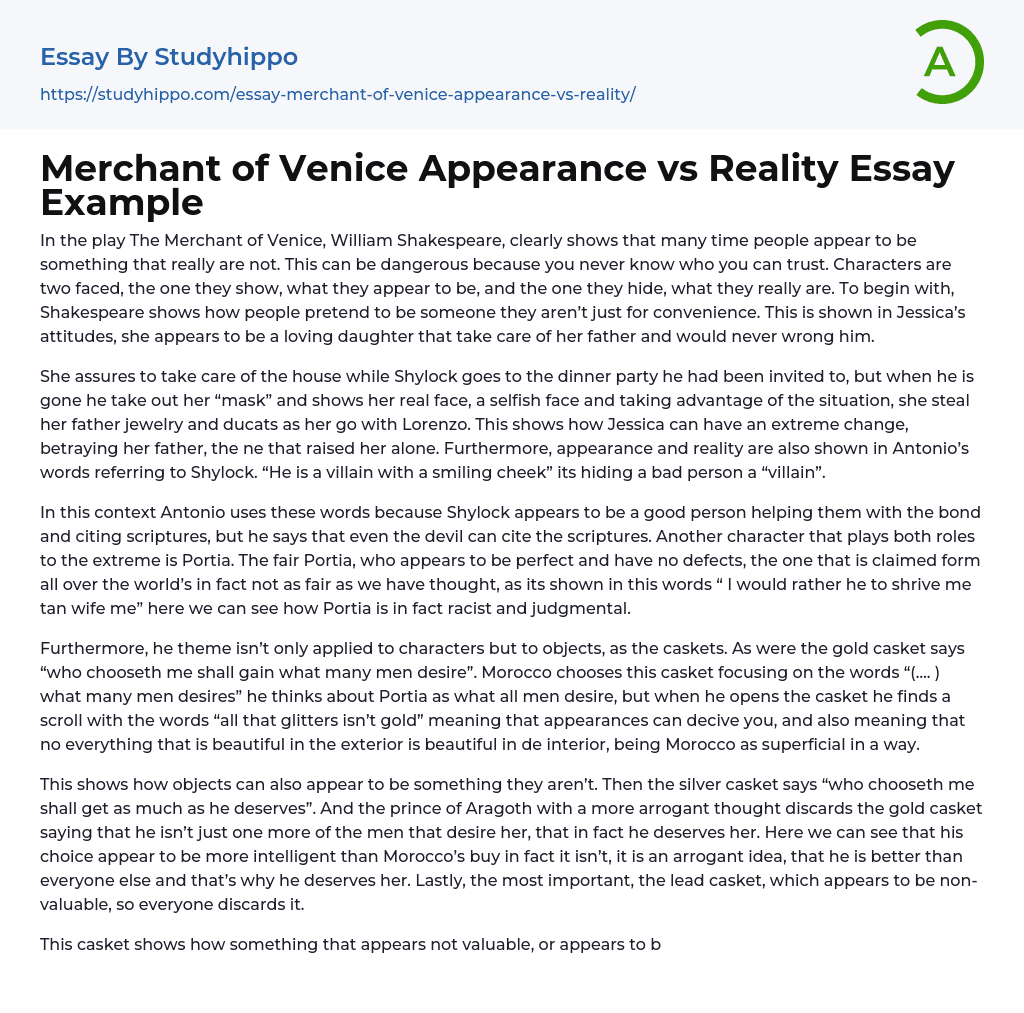In the play The Merchant of Venice, William Shakespeare, clearly shows that many time people appear to be something that really are not. This can be dangerous because you never know who you can trust. Characters are two faced, the one they show, what they appear to be, and the one they hide, what they really are. To begin with, Shakespeare shows how people pretend to be someone they aren’t just for convenience. This is shown in Jessica’s attitudes, she appears to be a loving daughter that take care of her father and would never wrong him.
She assures to take care of the house while Shylock goes to the dinner party he had been invited to, but when he is gone he take out her “mask” and shows her real face, a selfish face and
...taking advantage of the situation, she steal her father jewelry and ducats as her go with Lorenzo. This shows how Jessica can have an extreme change, betraying her father, the ne that raised her alone. Furthermore, appearance and reality are also shown in Antonio’s words referring to Shylock. “He is a villain with a smiling cheek” its hiding a bad person a “villain”.
In this context Antonio uses these words because Shylock appears to be a good person helping them with the bond and citing scriptures, but he says that even the devil can cite the scriptures. Another character that plays both roles to the extreme is Portia. The fair Portia, who appears to be perfect and have no defects, the one that is claimed form all over the world’s in fact not as fai
as we have thought, as its shown in this words “ I would rather he to shrive me tan wife me” here we can see how Portia is in fact racist and judgmental.
Furthermore, he theme isn’t only applied to characters but to objects, as the caskets. As were the gold casket says “who chooseth me shall gain what many men desire”. Morocco chooses this casket focusing on the words “(…. ) what many men desires” he thinks about Portia as what all men desire, but when he opens the casket he finds a scroll with the words “all that glitters isn’t gold” meaning that appearances can decive you, and also meaning that no everything that is beautiful in the exterior is beautiful in de interior, being Morocco as superficial in a way.
This shows how objects can also appear to be something they aren’t. Then the silver casket says “who chooseth me shall get as much as he deserves”. And the prince of Aragoth with a more arrogant thought discards the gold casket saying that he isn’t just one more of the men that desire her, that in fact he deserves her. Here we can see that his choice appear to be more intelligent than Morocco’s buy in fact it isn’t, it is an arrogant idea, that he is better than everyone else and that’s why he deserves her. Lastly, the most important, the lead casket, which appears to be non-valuable, so everyone discards it.
This casket shows how something that appears not valuable, or appears to be not worth can be so important. And what Portia’s father wanted was someone
that values her fortune and above all someone that would give all for her, that’s why the casket said “who chooseth me must give and hazard all he hath” To conclude, Shakespeare shows in his play how appearances can deceive us in very different ways and it’s always better to look beyond the appearances and give us into the content of the character of a person. He also shows this in a very literal way with objects.
- Acceptance essays
- Age Of Enlightenment essays
- Child Observation essays
- Confucianism essays
- Conscience essays
- Critical Reflection essays
- Destiny essays
- Determinism essays
- Empiricism essays
- Environmentalism essays
- Epistemology essays
- Ethics essays
- Ethos essays
- Existence essays
- Existentialism essays
- Fate essays
- Free Will essays
- Functionalism essays
- Future essays
- Good And Evil essays
- Human Nature essays
- Individualism essays
- Meaning Of Life essays
- Metaphysics essays
- Natural Law essays
- Personal Philosophy essays
- Philosophers essays
- Philosophy Of Life essays
- Political Philosophy essays
- Pragmatism essays
- Reality essays
- Relativism essays
- Teaching Philosophy essays
- Time essays
- Transcendentalism essays
- Truth essays
- Utilitarianism essays
- A Doll's House essays
- A Midsummer Night's Dream essays
- A raisin in the sun essays
- A Streetcar Named Desire essays
- An Inspector Calls essays
- Death of a salesman essays
- Everyman essays
- Fences essays
- Hamlet essays
- Hedda Gabler essays
- Iago essays
- King Lear essays
- Macbeth essays




